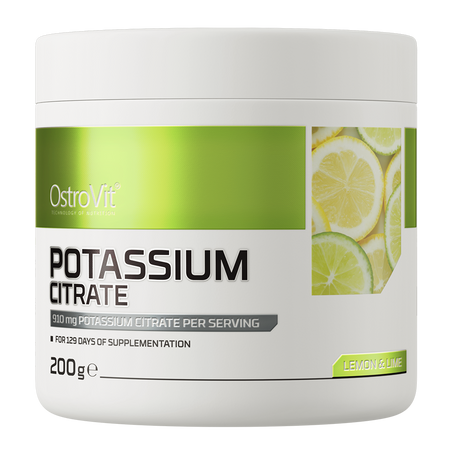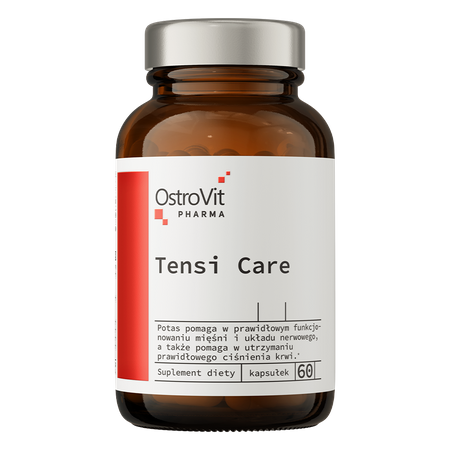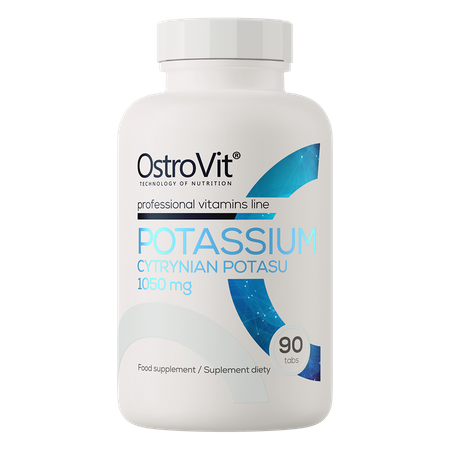Potassium
Potassium is an element that cares for the proper functioning of muscles and water and electrolyte balance. In addition, the macroelement participates in many enzymatic reactions and supports the maintenance of acid-base balance.
It is a mineral component that has a much greater impact on the proper functioning of the system than you think. Therefore, it is extremely important that every day it is present in your diet.
What is Potassium?
Potassium is a chemical element from the group of alkali metals. It is a mineral component classified as macroelements, i.e. substances that occur in the human body in an amount greater than 0.01%.
It is an extremely important electrolyte that determines the proper functioning of the entire system. Most of the macronutrient is absorbed into the blood in the upper small intestine. Excretion, on the other hand, takes place in 90% by the kidneys.
Sources of potassium in the diet
Potassium is found in many foods, which is why a properly balanced diet should provide the body with adequate amounts of the element every day.
Potassium-rich food include:
- potatoes,
- bananas,
- tomatoes,
- wholegrain products,
- cereals,
- dried fruit,
- cocoa and chocolate,
- groats,
- bran,
- apricots,
- figs,
- apples.
Properties and role of potassium in the body
Potassium has the ability to carry electric charges. In the body, it occurs in the form of ions, and together with sodium and chlorine ions, it takes care of appropriate concentrations on both sides of the cell membrane. Thus, it enables the conduction of nerve impulses and affects the work of muscles, including the heart muscle.
The element also participates in regulating the osmotic pressure and pH of cells. Due to the ease of movement of potassium through cell membranes, it provides cells with essential nutrients and participates in the removal of metabolic products. In addition, the macroelement dissolves well in water, takes care of acid-base balance and water-electrolyte balance.
Adequate levels of potassium in the body can lower blood pressure and positively affect the vascular endothelium. In addition, potassium is involved in protein synthesis and many enzymatic reactions. It also participates in the burning of proteins and carbohydrates.
The element can affect the oxygenation of the brain, and thus improve thought processes and concentration. In addition, potassium can stop platelets from clumping together and stimulate insulin secretion.
Potassium requirement
According to the Nutrition Standards, the daily requirement for potassium at the level of sufficient intake (AI) for both women and men is 4700 mg. Also among pregnant women this value is equal to 4700 mg / day, while during lactation it increases to 5100 mg / day.
Among children and adolescents, the requirement ranges from 2,400 mg to 4,700 mg per day and depends on gender and age.
Increased demand for macronutrient can be observed among athletes, people exposed to permanent stress, as well as in the group of chronically ill.
Potassium deficiency in the body
Potassium deficiency, also called hypokalemia, can be caused by insufficient supply of the element with diet, as well as malnutrition. Too low potassium levels in the body may result from excessive loss of the ingredient as a result of intense physical exercise or by the occurrence of ailments such as diarrhea or vomiting. Hypokalemia can also be triggered by diuretics, alcohol, coffee and laxatives.
The symptoms of potassium deficiency include:
- muscle weakness,
- muscle cramps,
- constipation,
- muscle tremors,
- irregular heartbeat,
- nervous hyperactivity,
- problems with concentration,
- chronic fatigue.
If left untreated, hypokalaemia can lead to an increase in blood pressure and arrhythmias.
Excess potassium in the body
Hyperkalemia, i.e. too high level of potassium in the body, may result from erroneous supplementation or impaired excretion of the element caused by renal failure or adrenal insufficiency.
Also, some drugs may contribute to the occurrence of hyperkalemia, incl. non-steroidal anti-inflammatory drugs or heparin.
Symptoms of excess potassium include:
- weakness,
- apathy,
- confusion,
- slowing heart rate,
- kidney disorders,
- disorders of consciousness and sensation.
Advanced hyperkalemia can block the natural process of excretion of excess potassium from the body and contribute to heart disorders.
Potassium supplementation - for whom is it recommended?
Supplementation with preparations rich in potassium should be considered by people who are exposed to worse absorption of the element or its increased leaching from the body.
Thus, athletes and people who lead an active lifestyle should pay special attention to the supply of macroelement, which supports the work and regeneration of muscles. During intense exercise, significant amounts of electrolytes, including potassium, are removed from the body with sweat. Therefore, it is extremely important to supplement the losses of the element.
Also during long-term therapies with certain drugs, e.g. for the heart or pressure, it is worth considering the use of additional potassium supplementation after consulting a doctor. This is due to the fact that pharmaceuticals often hinder the absorption of vitamins and minerals, and sometimes also flush valuable electrolytes from the body.
Permanent stress is also not conducive to homeostasis of the body. Adding to this frequent use of stimulants in the form of coffee or tea, which increase the leaching of electrolytes from the body, we can contribute to increasing macronutrient deficiencies in the body. Therefore, among people leading an intense lifestyle and exposed to stress, it is worth taking advantage of the benefits of supplementation.


 New
New





 Bestseller
Bestseller